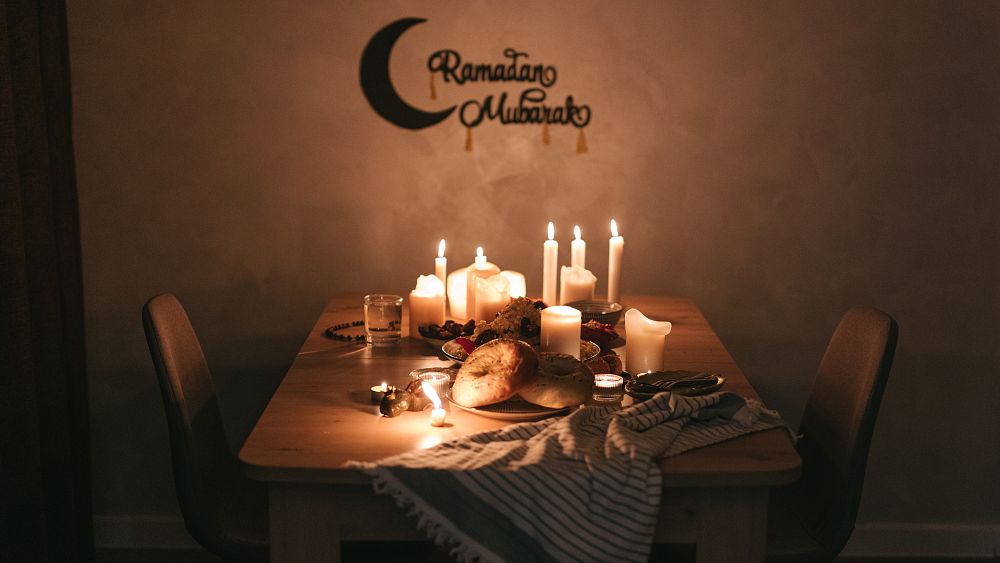
Ramadan is the ninth month of the Muslim calendar and the holy month of fasting and prayer. Islam, the world’s second most widely practised religion, unites almost two billion people, or about 25% of the world’s population.
This year, Ramadan begins on 22 or 23 March and will last until around 21 April.
It begins 10 to 12 days earlier each year because the Islamic calendar is based on the lunar Hijri calendar. As such, the lunar year is shorter than the solar year, with months that are 29 or 30 days long.
In 2030, Ramadan will be celebrated twice: at the beginning of the year (approximately from 5 January ) and at the end of the year (beginning from about 25 December).
Ramadan’s precise start date is usually determined by the religious authorities of each country, and only officially confirmed at the very last moment, or even on the first day itself.
The word “Ramadan” is pronounced differently in different countries of the Muslim world.
In Iran, Turkey, Azerbaijan, Pakistan, and India, the name of the holy month is pronounced “Ramadan”, in accordance with the Persian tradition. In Bangladesh, it’s pronounced, “Romzan.”
Why observe Ramadan?
Muslims believe that all scriptures were revealed to the prophets during the month of Ramadan: the scrolls of Abraham, the Torah, the Psalms, the Gospel, and the final revelation, the Quran.
Prophet Muhammad is believed to have received his first Qur’anic revelation on Laylat al-Qadr, one of the five odd nights in the last ten days of Ramadan, after days of persistent prayer and solitude.
Although Muslims were first enjoined to fast in the second year of the Hijra (624 AD), many believe that the practice of fasting had always been necessary for believers to achieve taqwa – the fear of God.
The pre-Islamic pagans of Mecca are believed to have fasted on the tenth day of Muharram to atone for sin and avoid drought.
Other scholars argue that the observance of Ramadan itself is linked to adherence to strict discipline in the early Syriac churches, though this claim is disputed by some Muslim scholars.
What does Ramadan consist of?
Ramadan fasting involves abstaining from eating or drinking from sunrise to sunset. The fasting lasts for the whole month, and ends with the Eid-el-Fitr or – in the tradition of some countries and regions – Uraza-Bairam.
In the Russian Federation, this holiday is officially a non-working day in regions with a large Muslim population, such as Adygeya, Bashkortostan, Daghestan, Ingushetia, Kabardino-Balkaria, Karachay-Cherkessia, Tatarstan, and Chechnya.
Ramadan fasting is one of the most observed tenets of Islam. According to surveys, it is practised by 70-80% of Muslims.
Fasting is obligatory for all Muslim men and women from the age of puberty. In some countries, parents encourage their children to fast for half a day from the age of ten in order for them to become accustomed to fasting.
Eating during Ramadan
The first meal of the day, suhur, should be completed before dawn. After the fast, full sunset and evening prayer follows – ifrat – the second and last meal of the day.
Planning the morning and evening menus is a special part of Ramadan. Although culinary traditions differ from one country to another, the general principles remain the same: Eat light but nourishing food in the morning and include dried fruit, meat, and vegetables in the evening.
For suhur, popular dishes include bean dishes such as ‘ful Ramadan’, brik with egg in some north African countries, bolani (Afghan flatbread stuffed with jacket potato), fruit salads, and porridge.

Traditionally, for the evening iftar, the dinner table features dates, shorba (a lentil soup popular in the Middle East), and kima samosa – a treat among Indian Muslims: crispy fritters with a fragrant filling of minced lamb with the addition of ginger, chilli, mint and garam masala. Lamb halim and meat kebabs are also popular.
What else should a fasting person do?
During Ramadan, believers are expected to behave honourably, make self-improvements, and carry out good deeds for their relatives and neighbours.
Helping the underprivileged is also a key expectation, and offering food to those who are hungry after sunset is considered a good deed.
Who can be exempted from fasting
Pregnant and nursing women, children who have not reached puberty, the elderly, and those suffering from chronic diseases, including mental illness, are exempt from observing Ramadan.
It is also possible to eat and drink during Ramadan if taking a long journey. In some of these cases, the believer is expected to make up for those days missed at a later date.
Ramadan in European countries
Ramadan is observed by numerous Muslim communities across Europe.
In the UK, about 6.5% of the population is Muslim, according to the last census in 2021. Ramadan for British Muslims begins on Wednesday 22 March.
Believers in France and Spain will start the holy fast on the same day.
The French are still debating how to set a date for fasting: on the one hand, there are astronomical calculations that clearly predict the phases of the moon. On the other, there is a tradition of observing the lunar month with the naked eye, and its appearance in the sky at the beginning of Ramadan marks the beginning of fasting.
The Council of National Muslim Federations, which meets at the Grand Mosque in Paris, believes that the two methods complement each other. This is why, in France, the start date of Ramadan is always known in advance.
Around 3.5 million people practice Islam in France, owing to its large Maghreb community.
In Spain, where there has been a historical link with the Muslim world since the Reconquista, there are now more than two million followers of Islam. The largest communities are found in Catalonia and Andalusia.
Ramadan in the Russian Federation
In Russia, estimates suggest that Muslims constitute about 10% of the population.
Traditional Muslims represent the majority of the population in seven entities: Ingushetia, Chechnya, Daghestan, Kabardino-Balkaria, Karachay-Cherkessia, Bashkortostan, and Tatarstan.
However, a smaller part of these national communities adheres to basic religious tenets.
For Russian Muslims, Ramadan begins on 21 March and ends on the evening of 20 April.



